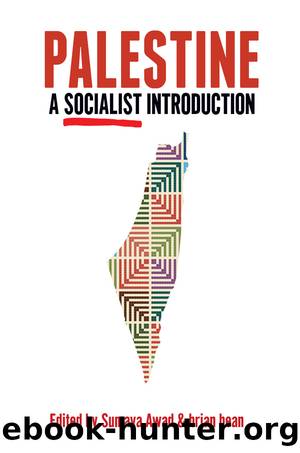Palestine: A Socialist Introduction by Sumaya Awad brian bean

Author:Sumaya Awad, brian bean
Language: eng
Format: epub
Publisher: Haymarket Books
Published: 2020-11-02T00:00:00+00:00
2011 and the end of the status quo
An âIsraeli-inspired regional status quoâ is the term academic Yaniv Voller used to describe the regional state of affairs prior to the Arab Spring. âWith the overthrow of the Mubarak regime, Israel has now lost a leader who shared with it a desire for maintaining the âstableâ status quo,â Voller wrote in 2012. In a policy paper published by the World Bank, Nadia Belhaj Hassine explains that âdeteriorating standards of living, high and rising unemployment, and growing perceptions of exclusionâ were factors that pushed Arabs to revolt in 2011. The combination of these factors cannot possibly describe a situation as stable, unless stable here means the silencing of popular demands for the sake of prioritizing Israelâs interests.13 Stability, from Israelâs perspective, means the domestication of the region while it continues its settler-colonial expansion on Palestinian and Arab lands without facing any form of resistance or accountability. A major instrument for maintaining the status quo was the peace agreements signed between Arab states, the PLO, and Israelâagreements that were possible only because of the influence of the presence of elites and leaderships that benefit from such agreements against the interests and wishes of the people they claim to rule in their name.
For the Israeli political and security establishment, the terms âArab Springâ and âuncertaintyâ became almost interchangeable. While Tunisian and Egyptian masses were on the streets calling for âbread, freedom, and social justiceâ and demanding their presidents to âdégageâ (get out),14 the prime minister of the âonly democracy in the Middle Eastâ stated that the Arab world was engulfed by an âIslamic, anti-western, anti-liberal, anti-Israel, undemocratic wave.â15 How is it that âthe only democracy in the Middle East,â with its political leadership and intellectual class, can speak of uncertainty and impending doom, when its neighbors ask for exactly what Israel claims to stand forâa thriving and representative political system where leadership can be held accountable if they deviate from maintaining the interests of their nations? For years, Western intellectuals and policy makers spoke of lack of Arab readiness for democracy; chiefly among them of course was Bernard Lewis, who, in response to the Arab uprisingsâ call for democratic reforms stated that Arabs âare simply not ready for free and fair elections.â16 He added that âin genuinely fair and free elections, [the Muslim parties] are very likely to win and I think that would be a disaster.â17
Other commentators and writers in the West shared Lewisâs grim vision of how things will unfold as a result of the uprisings. David Ignatius, a Washington Post columnist, wrote in July 2012 that the Arab Spring was âIsraelâs problem.â18 Ignatius cited Netanyahuâs fear that the election of Mohamed Morsi of the Muslim Brotherhood would lead to âan erosion of the relationship with Egypt over time.â Yet the détente between Egypt and Israel has never been about temporary changes in leadership, reflecting instead a deeper alignment between the political and economic establishments of both countries. This discourse, which makes the
Download
This site does not store any files on its server. We only index and link to content provided by other sites. Please contact the content providers to delete copyright contents if any and email us, we'll remove relevant links or contents immediately.
| Arms Control | Diplomacy |
| Security | Trades & Tariffs |
| Treaties | African |
| Asian | Australian & Oceanian |
| Canadian | Caribbean & Latin American |
| European | Middle Eastern |
| Russian & Former Soviet Union |
The Secret History by Donna Tartt(16657)
The Social Justice Warrior Handbook by Lisa De Pasquale(11493)
Thirteen Reasons Why by Jay Asher(7801)
This Is How You Lose Her by Junot Diaz(5797)
Weapons of Math Destruction by Cathy O'Neil(5046)
Zero to One by Peter Thiel(4834)
The Myth of the Strong Leader by Archie Brown(4795)
Promise Me, Dad by Joe Biden(4455)
Beartown by Fredrik Backman(4433)
Stone's Rules by Roger Stone(4422)
How Democracies Die by Steven Levitsky & Daniel Ziblatt(4413)
The Fire Next Time by James Baldwin(4350)
100 Deadly Skills by Clint Emerson(4085)
A Higher Loyalty: Truth, Lies, and Leadership by James Comey(4039)
Rise and Kill First by Ronen Bergman(4020)
The David Icke Guide to the Global Conspiracy (and how to end it) by David Icke(3891)
The Farm by Tom Rob Smith(3878)
Secrecy World by Jake Bernstein(3788)
The Doomsday Machine by Daniel Ellsberg(3737)
